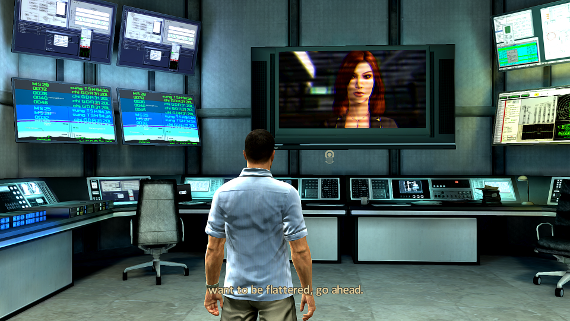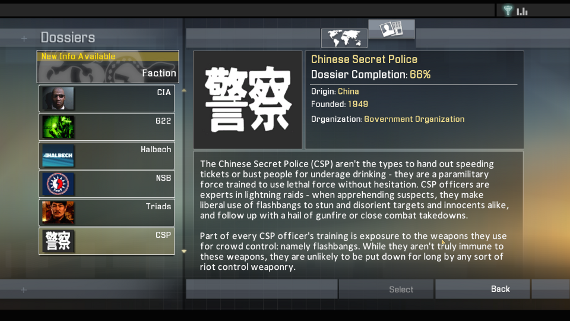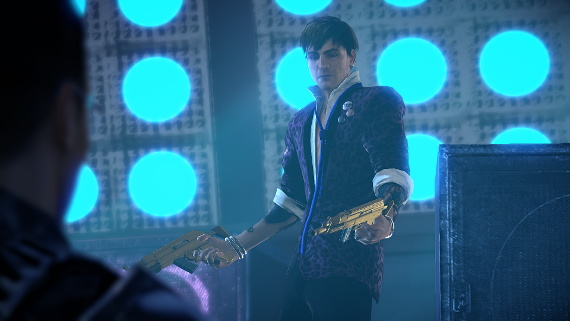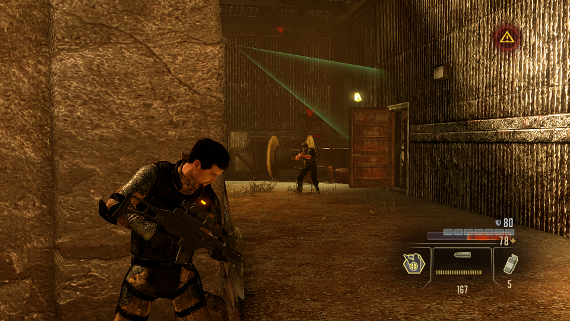
There’s no getting around it: Alpha Protocol is a talky game. There are lots of people to talk to and each of them has lots of different things to say. In fact, some of the missions in the game consist of literally nothing but extended conversations. For example, if your mission consists of meeting a contact in Rome, you’re shown a cutscene showing you sitting down at a cafe and it’s jaw-jaw time. All of it fully voice-acted of course.
But you know what’s even more amazing? Depending how what you say to which person or what actions you take in-game, many conversations down the line can go entirely differently or might never take place at all. For instance, after I’d finished my play through, I restarted the game as a veteran with a nice pool of skill points to play with right from the beginning. After going through the basic weapons tutorial, the trainer offered me an advanced challenge I hadn’t seen before. This consisted of shooting a colleague in the nuts with rubber rounds. From that point on, this colleague would frequently insert references to this incident in all his conversations with me. It blew my mind how much hidden content there is in this game.
Because just as it takes RPG combat seriously, so too does Alpha Protocol deal with another aspect of the genre: choice and consequence. There are many decisions to make in the game. Some of them may seem trivial, such as whether to treat a contact professionally or use a jokey attitude with him. Others may seem like boring grunt work, such whether or not to spend resources to buy additional intel prior to a mission. A few you are immediately aware are momentous, such as whether to execute a known terrorist on the spot or to allow him to go free so that he can help you crack open the wider conspiracy. But all these decisions irrevocably change the game so that no two play throughs of Alpha Protocol are exactly alike. Even the game’s wiki surrenders. It lists many of the possible endings but claims that there are too many combinations of different paths to compile them all.

Every element of the design serves to reinforce the message that your choices matter. There’s no save-anywhere system for example. You get an in-mission checkpoint and a safehouse checkpoint and that’s it. You can save an extra copy of these checkpoints if you want but it’s generally too tedious to do any save scumming so you learn to live with your choices. You also earn all manner of perks that help reinforce a certain playstyle. Take out enough enemies in unarmed combat and you automatically get a bonus to close quarters combat. Kill enough enemies with an assault rifle and you do more damage with all weapons of that class. Because you’re not shown a list of all perks in advance, it’s hard to game the system and there are all manner of unexpected perks. You even get one for talking your way past guards.
Another example is the conversation system. I didn’t much care for the heavily advertised feature of how your Thorton has three general approaches to dialogue: aggressive, suave and professional reflecting the styles of the three JBs of spy fiction respectively: Jack Bauer, James Bond and Jason Bourne. But I did like how you have a limited amount of time to select a dialogue response. This helps to prevent the player from trying to figure out the optimal response in any situation and simply choose responses from your gut. The story that you get then evolves naturally from your instinctive choices and personal preferences.
Even seemingly immaterial choices turn out to have important consequences. The game starts you off in Saudi Arabia but after that moves to a hub system that should be familiar to all RPG fans. Each of the three hubs in Rome, Moscow and Taipei has its own set of missions and you’re free to choose any hub to play in. In most games, the sequence that you pick for the hubs and associated missions doesn’t matter, you’re trained to expect that the endgame is only reached by completing all critical missions in all hubs. Not so in Alpha Protocol. Not only does the results of each mission in a single hub carry over into subsequent missions, but missions in one hub can impact others in another hub. So a boss enemy in Moscow can be a royal pain to handle normally but make friends with a particular contact in Taipei and he can turn this fight into a cake walk for you.

To give you an idea of the richness of the narrative all this creates, just let me tell you that the spoiler thread for this game on QT3 runs to five pages and is full of people exclaiming, “I never knew this could happen in the game!” The main structure of the story never changes much, but plenty of elements are up to you: who lives and who dies, who’s your enemy and who’s your friend etc. In a cool twist on the traditional postgame epilogue, Alpha Protocol uses a voice-acted news report to summarize what happens to the world as a consequence of your actions. Do the terrorists bomb the West Bank? Does President Sung of Taiwan live? Do the Russians and the Chinese gain a competitive advantage in the global arms market over the US?
Granted, the overall story in Alpha Protocol is still not that great. The best thing to be said about it is that it’s honest and up-front about things, instead of trying to be clever with twists. But what makes the narrative great is how many little variations exist. Anyway, I’ve probably already written more in these two posts than people are willing to read, so let’s just end with a summary of some of the other stuff that I think are neat and stuff that could be improved upon.
The Neat Stuff
- Best e-mail interactions in any RPG ever. The computer-based system for buying and selling equipment and intel works great too. I still remember what a terrible inventory system the first Mass Effect had.
- There are a surprisingly diverse range of options for navigating through a level. Plus changing the difficulty doesn’t just add more damage and health to enemies. I’ve noticed that it also changes the guards’ patrol patterns and actions required to accomplish some objectives.
- Weapons are different in meaningful ways and only gets more so the deeper you get into each tree. It’s great that even melee combat is included and you can make a Jet Li superspy if you want to.
- The Recruit / Veteran start options add lots of variation to a game that already has a tremendous amount of replayability.
The Complaints List
- Boss battles? Why, just why? Don’t you understand that fighting a helicopter on foot has been done to death already? Why can’t you see that a corporate CEO armed with a missile launcher is a ludicrous opponent?
- Levels are too small. Plus it’s annoying how walking through key doors automatically seals them shut forever so you can’t go back without the game warning you that this will happen.
- The enemy AI is so bad it’s ridiculous. They need a broader range of scripted behaviors to seem like credible opponents, such as reacting to doors opening right in front of them, their friends being knocked out right behind them etc.
- Overall, there’s still the familiar Obsidian sense that some things were left unfinished or were unpolished because they ran out of time and money.

Leave a Reply